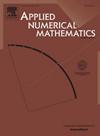求解对称特征值问题的贪婪随机坐标更新迭代方法
IF 2.4
2区 数学
Q1 MATHEMATICS, APPLIED
引用次数: 0
摘要
为了计算大规模实数对称矩阵的最小特征值及其对应的特征向量,我们提出了一类贪婪随机坐标更新迭代方法,该方法基于当前残差绝对值中较大条目的指标选择概率较高的原则,并且对于该指标集,下一个迭代是在当前迭代的基础上进行更新,并选择相应的坐标,使得残差的对应条目被湮灭,从而使所提出的迭代方法收敛速度快。在适当的条件下,我们用期望证明了瑞利商序列和迭代与特征向量之间的锐角的收敛性。通过数值实验证明,这类贪婪随机坐标更新迭代方法在迭代次数和计算次数上都优于参数化幂次法和坐标下降法。此外,通过理论分析和计算性能证明,适当选择贪心概率准则中涉及的任意非负参数,可以显著提高这类迭代方法的收敛性。本文章由计算机程序翻译,如有差异,请以英文原文为准。
On greedy randomized coordinate updating iteration methods for solving symmetric eigenvalue problems
In order to compute the smallest eigenvalue and its corresponding eigenvector of a large-scale, real, and symmetric matrix, we propose a class of greedy randomized coordinate updating iteration methods based on the principle that the indices of larger entries in absolute value of the current residual are selected with a higher probability and, with respect to this index set, the next iterate is updated from the current iterate along with the selected coordinate such that the corresponding entry of the residual is annihilated, resulting in fast convergence rates of the proposed iteration methods. Under appropriate conditions, we prove the convergence of both sequences of the Rayleigh-quotients and the acute angles between the iterates and the eigenvector in terms of the expectation. By numerical experiments, we show that this class of greedy randomized coordinate updating iteration methods are advantageous over the parameterized power method and the coordinate descent method in both iteration counts and computing times. Moreover, with theoretical analysis and computational performance, we confirm that the convergence property of this class of iteration methods can be improved significantly by suitably choosing the arbitrary nonnegative parameter involved in the greedy probability criterion.
求助全文
通过发布文献求助,成功后即可免费获取论文全文。
去求助
来源期刊

Applied Numerical Mathematics
数学-应用数学
CiteScore
5.60
自引率
7.10%
发文量
225
审稿时长
7.2 months
期刊介绍:
The purpose of the journal is to provide a forum for the publication of high quality research and tutorial papers in computational mathematics. In addition to the traditional issues and problems in numerical analysis, the journal also publishes papers describing relevant applications in such fields as physics, fluid dynamics, engineering and other branches of applied science with a computational mathematics component. The journal strives to be flexible in the type of papers it publishes and their format. Equally desirable are:
(i) Full papers, which should be complete and relatively self-contained original contributions with an introduction that can be understood by the broad computational mathematics community. Both rigorous and heuristic styles are acceptable. Of particular interest are papers about new areas of research, in which other than strictly mathematical arguments may be important in establishing a basis for further developments.
(ii) Tutorial review papers, covering some of the important issues in Numerical Mathematics, Scientific Computing and their Applications. The journal will occasionally publish contributions which are larger than the usual format for regular papers.
(iii) Short notes, which present specific new results and techniques in a brief communication.
 求助内容:
求助内容: 应助结果提醒方式:
应助结果提醒方式:


